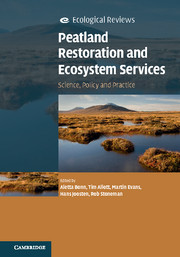Book contents
- Frontmatter
- Contents
- List of contributors
- Foreword
- Acknowledgements
- 1 Peatland restoration and ecosystem services: an introduction
- Part I Peatland ecosystems services
- 2 Peatlands across the globe
- 3 Peatland biodiversity and its restoration
- 4 The role of peatlands in climate regulation
- 5 Peatland restoration and hydrology
- 6 Peatlands as knowledge archives
- 7 Peatlands and cultural ecosystem services
- 8 Peatlands and climate change
- Part II Perspectives on peatland restoration
- Part III Socio-economic and political solutions to managing natural capital and peatland ecosystem services
- References
- Index
6 - Peatlands as knowledge archives
from Part I - Peatland ecosystems services
Published online by Cambridge University Press: 05 June 2016
- Frontmatter
- Contents
- List of contributors
- Foreword
- Acknowledgements
- 1 Peatland restoration and ecosystem services: an introduction
- Part I Peatland ecosystems services
- 2 Peatlands across the globe
- 3 Peatland biodiversity and its restoration
- 4 The role of peatlands in climate regulation
- 5 Peatland restoration and hydrology
- 6 Peatlands as knowledge archives
- 7 Peatlands and cultural ecosystem services
- 8 Peatlands and climate change
- Part II Perspectives on peatland restoration
- Part III Socio-economic and political solutions to managing natural capital and peatland ecosystem services
- References
- Index
Summary
Introduction
The waterlogged and anoxic conditions within peatlands can result in the exceptional preservation of a diverse range of material, which provides a unique record of past societies and the environment. Organic remains which are entirely lost from the record on dryland sites may be preserved for millennia within peat. Certain of these finds are among the most vivid and also the most vulnerable evidence of past people and cultures that archaeology is able to provide the world over. Peat also preserves a wide range of ‘fossil’ material that has long been central to understanding patterns of vegetation change and human impact on the environment. Recent work is now beginning to realise the full potential of peatlands as records of climatic change that may be regarded as the terrestrial equivalent of ice core records. Both the archaeological and palaeo-environmental records are fragile, finite and unique resources, the future survival of which is inseparable from the fate of peatlands.
Three interrelated aspects of peatlands as knowledge archives (archaeology, palaeoecology and conservation ecology; Figure 6.1) can be broadly defined which have synergies but has generally different research agendas, although knowledge transfer between the areas of archaeology/palaeoecology and conservation ecology has increased in recent years (see below). One aim of this chapter is to illustrate the distinctive value of the peatland archive for each of these agendas, but also to highlight the specific value of such work within the context of ecosystem services.
In particular, by providing long-term records of ecological processes that cannot be attained through ‘real-time’ monitoring projects, palaeo-environmental data have the potential to inform the future restoration and management of peatlands. Finally, the archaeological and palaeo-environmental archive is also vulnerable to a range of threats, and this chapter discusses the importance of integrated restoration and management to best protect this fragile resource.
The archaeo-environmental record of peatlands
The archaeological and palaeo-environmental (archaeo-environmental for short) record of peatlands is included in the ‘Cultural services’ section of the peatland ecosystem services framework within the ‘Physical and intellectual interaction with biota, ecosystems, and landscapes’ division and the ‘Intellectual and representative interactions’ group (see Chapter 1; Table 1.1).
- Type
- Chapter
- Information
- Peatland Restoration and Ecosystem ServicesScience, Policy and Practice, pp. 95 - 113Publisher: Cambridge University PressPrint publication year: 2016
- 9
- Cited by



